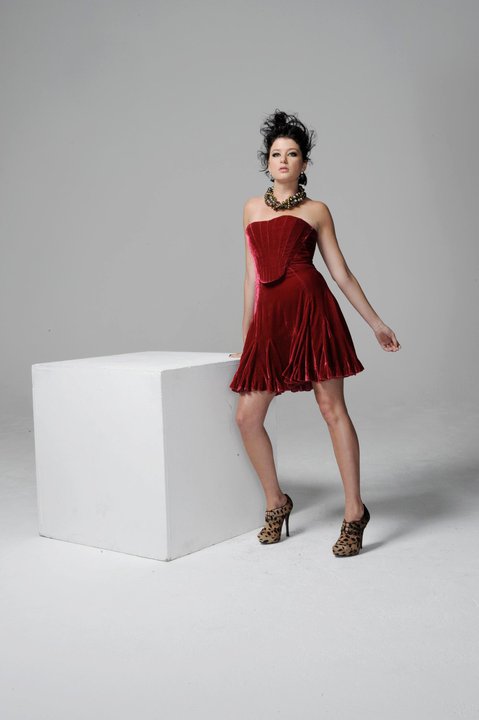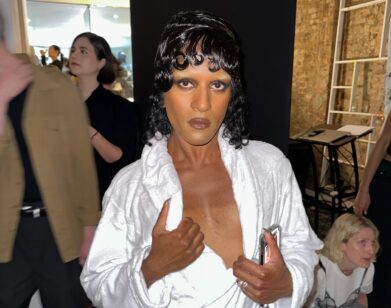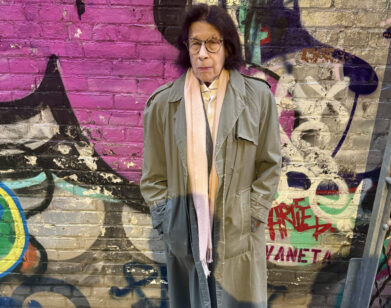Molly McAleer Widens Her Net

ABOVE: MOLLY MCALEER. PHOTO COURTESY OF JON COTTAM
Molly McAleer’s personality is like your best friend’s older sister—the kind that would berate you for you shoes, haircut, and music taste, but only in a way that made you want to wear better shoes, get a better haircut, and listen to better music. Perhaps that’s why she’s gotten this far in Hollywood this young: simply by being herself. Back when I first met her in 2007, she had a cult following in Los Angeles for her daily video-blogging series on now-defunct website Defamer—a former arm of the Gawker Media franchise. After that gig ended, she turned what would normally be most people’s “lost” years into a glorious ascension into the weird new world of Internet celebrity, ending up with a plum writing gig on 2 Broke Girls—a breakout freshman hit this season, up for a People’s Choice Award—as well as co-founding a web venture for women, Hello Giggles, with Zooey Deschanel. She’s come a long way from her video-blogging days.
Before a table read, I was lucky enough to catch her for an hour for an interview. It was good to hear her voice again, and luckily, her apparent success had not changed her personality: she was as sardonic as ever.
NED HEPBURN: So, let’s start at the beginning. What do you think about the word “vlogger”?
MOLLY MCALEER: I think it’s adorable. I love it, but it feels antiquated to me. Video blogging is so commonplace and such an integral part of personal branding that I think it deserves more than a word blend. It’s still a lot better than “lifecasting,” though. I’ll think on this.
HEPBURN: How important were your Twitter and social media accounts to you in getting hired for 2 Broke Girls?
MCALEER: My Twitter and Internet stuff really had nothing to do with anything. It didn’t hurt me in any way, but it’s a completely separate thing. People knowing me on the Internet helped with Hello Giggles. I got hired on 2 Broke Girls for the sample script I wrote, and none of my other work, and then of course Hello Giggles because I’d been on the web for a while, and worked for Defamer, and knew, basically, about making a web presence.
HEPBURN: How does one make a web presence?
MCALEER: I don’t really know any other way except the way I did it. People send me emails about that all the time. “I want to start a blog,” and “I want to be popular,” things like that. I worked for a media company; I got a small amount of exposure through Defamer, coupled with the personal blog. I worked on that every single day. Took a lot of photos, and like, really curated something. That was even before Tumblr, I did something on Vox—and that was what had people start being interested in my personal life.
I don’t think it’s about following a formula, because anyone can follow a formula and have no one care. But if you’re a good writer, or know how to take cool pictures, or if you understand what is funny or interesting… I think that that’s more helpful to you than just persistence. I would not have had the beginning Internet fan base that I had if it weren’t for Defamer. And I also wouldn’t have had that if it wasn’t for Tumblr, either. That brought a lot of eyes to my writing that I’m grateful for—but I honestly think it’s more about who you are than a formula.
HEPBURN: Do you ever go back and look at some of the older stuff from a few years back and think, “what was I thinking”?
MCALEER: Well, yeah. [laughs] But honestly, my attitude about that stuff is, yes, of course I’m embarrassed by some of the ways I acted when I was 23 years old and new to LA—but I’m also embarrassed by, say, a picture of myself when I was 14 years old, because I don’t know what I was thinking with my fashion sense. The thing is that I’m not ashamed of being human… I can always justify my own acts of humanness. I occasionally will remove an old YouTube video because I’ll say to myself, [affecting a voice] “You don’t need that up there!”
But for the most part, that’s why I started doing this – I started putting my life into words and putting it on the Internet so that I someday would have this time capsule of memories. I started out not thinking people would read it, I was really doing it for myself, so when I go back and I don’t have this, like, rock-and-roll 23-year-old lifestyle, I’m not embarrassed by it—I just accept it for what it was. I feel that—if anything—it makes me feel better about where I am now.
HEPBURN: When was the point at which you realized people were actually watching?
MCALEER: I started to get emails from people because my name was on the Defamer masthead. This was back when I was auditioning a lot. I was sitting at this audition, and these two guys scurried past in the hallway. And when I went home later, I had this email from these two guys, who were like, “We saw you at our office; we’re the biggest Molls fans.” I was like, “Whoa!” And you know what? I still talk to those guys, like, all the time. They’re like a writing team that I’ve become friends with now.
HEPBURN: When you and the rest of the Defamer team were let go, you took what most people would consider their “lost years” and made them productive. How did you keep positive after that?
MCALEER: I don’t know how I survived that time. To be honest with you, I feel like I’ve mentally blocked it out of my head. There were about six months that were so rough for me. I got a lot of freelancing one-time gigs as a result of being let go. A lot of other blogs wanted me to help out, but most of the time was spent so unemployed—so afraid! [laughs]
The year after I got laid off was probably the hardest of my life, hands down. I felt that I was so close—you know?—I had some freelance gigs, I had a web show that was being produced by Justine Bateman’s company, and I thought, “Maybe this will finally catapult me to the place where I belong,” and then that didn’t happen. After six or seven months we had, like, one sponsor; and I was like, “I have to have another job.” So I wound up logging tapes on reality shows, and writing gossip columns for $7, and doing so many random videography gigs, and I actually wound up getting a deal for an unscripted variety show with MTV. It was around a year and a half where I was kind of in limbo with this MTV development deal, just trying to get the concept out there so that we could a “yes” from MTV about whether or not they’d make a presentation, which would lead to a potential season of a show. And by the time I’d spent waiting for all of that to happen I had decided to write the sample script [for 2 Broke Girls] and just switched to TV writing. We put a kibosh on the deal with MTV. My agent had to call and say “Molly can’t do her show anymore because she’s going to write on another show,” that kind of thing. [laughs]
HEPBURN: Wow.
MCALEER: It was really and honestly two and a half years of me being told almost-yes after almost-yes, and, “You’re going to have success,” and, “Any one of these days now!” And then finally something clicked. I was surprised. I never suspected that I’d be a sitcom writer. I guess it had never occurred for some reason that it could be a really good fit for me. I made all those wrong turns to lead to this—which is something your grandma might say to you about life, that it takes a lot of wrong turns to wind up where you’re supposed to be.
HEPBURN: What is your relationship with Los Angeles? What does it mean to you?
MCALEER: My relationship with LA feels symbiotic, or like high school, or like the best place I could ever be, depending on the day. I’ve never really taken to it, but I don’t know where else I’d belong. I think I’m a very European person and that I probably belong in Europe, but it’s crazy expensive there, and all that Amanda Knox drama really stressed me out about foreign travel.
HEPBURN: Define “celebrity.”
MCALEER: Oh, man. I wish the answer to this was just “Julia Roberts,” because even though I’ve only seen like, three to five Julia Roberts movies, she still, in my mind, seems like the most famous person in the world. Celebrity just means being well-known or famous. That’s the meaning of the word. Obviously, our culture has experienced some serious evolution in regard to this entire concept over the last couple of decades, but that doesn’t change the definition.
HEPBURN: I remember your Wonder Years fixation. What’s it like working with [ex-Wonder Years child star turned TV director] Fred Savage?
MCALEER: Dude, the best. He’s super professional and talented. It was surreal, though. The Wonder Years is probably one of my favorite shows of all time, and he still totally looks like Kevin Arnold.
2 BROKE GIRLS AIRS AT 8 PM MONDAYS ON CBS. FOR MORE OF MOLLY MCALEER’S WRITING, VISIT HER WEBSITE AND HELLO GIGGLES.






